So here’s the thing, I’ve always been notorious for doing crazy things for chess. Like the time when I was 12 and traveled to a neighboring city for a tournament without knowing exactly where I’d sleep. Or when I entered a tournament without sufficient funds, believing I’d win a prize and use part of it to get myself back home.
The Invitation: A Rare Opportunity
A few years ago, I got an invitation to participate in a national trial to select a player who would represent Nigeria in the World Junior Chess Championship in Italy. It’s the biggest junior chess event in the world and Nigeria hadn’t been represented in over two decades. The only Nigerian ever to play there was Thomas Oparaugo back in 1986.
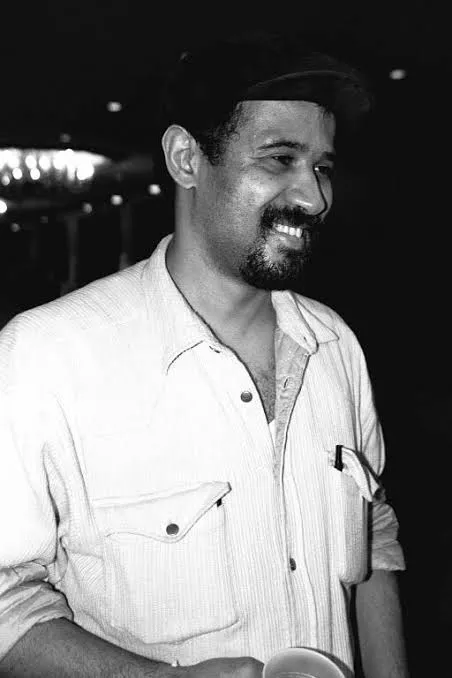
He was the one sponsoring the trial and has done so much to grow the chess community here. Personally, I’ve benefited from his support, and I’ll always be grateful.
The Road to the Trials
The invitation came in a special trial for the World Junior Chess Championship. Only the top 10 juniors in the country were invited, but there was a condition: every player must have a valid international passport. This was to ensure a smooth visa process immediately after the qualifiers.
And that’s where my real trouble began.
My passport had expired just a month earlier. I had planned to renew it whenever it was most convenient. I never imagined a moment like this would come, where timing meant everything. We were given just one week to confirm our participation, and the standard renewal process could take up to a month time I didn’t have.
Worse still, this was my last year as a junior. There wouldn’t be another chance.
I reached out to everyone I knew who might help. A friend eventually gave me a lead: I could travel to another state Abakaliki where the immigration office wasn’t as overwhelmed. I’d have to pay extra for fast-tracking, but I could get my passport in just a few days. The catch? Abakaliki was a 12-hour drive from Lagos.
But I had no choice.
I told my parents, packed my bag, and hit the road that very day. It was a Thursday, and although I left later than I wanted, the journey was thankfully smooth. I kept in touch with the agent who’d be assisting with the process, and by nightfall, I arrived in Abakaliki. I got a room in a guest house and crashed, exhausted.
First thing Friday morning, I headed to the immigration office. The agent was already waiting and began the renewal process right away. Before the day ended, he told me I could return to Lagos that the passport would be delivered to me later. But I wasn’t taking any chances. I decided to stay in Abakaliki until I had the passport in hand.
That decision came at a cost.
The weekend was around the corner, and government offices don’t operate on weekends. That meant I’d have to wait longer and spend more. But I made the most of it. I used the days to train, review games, and walk around the unfamiliar town.
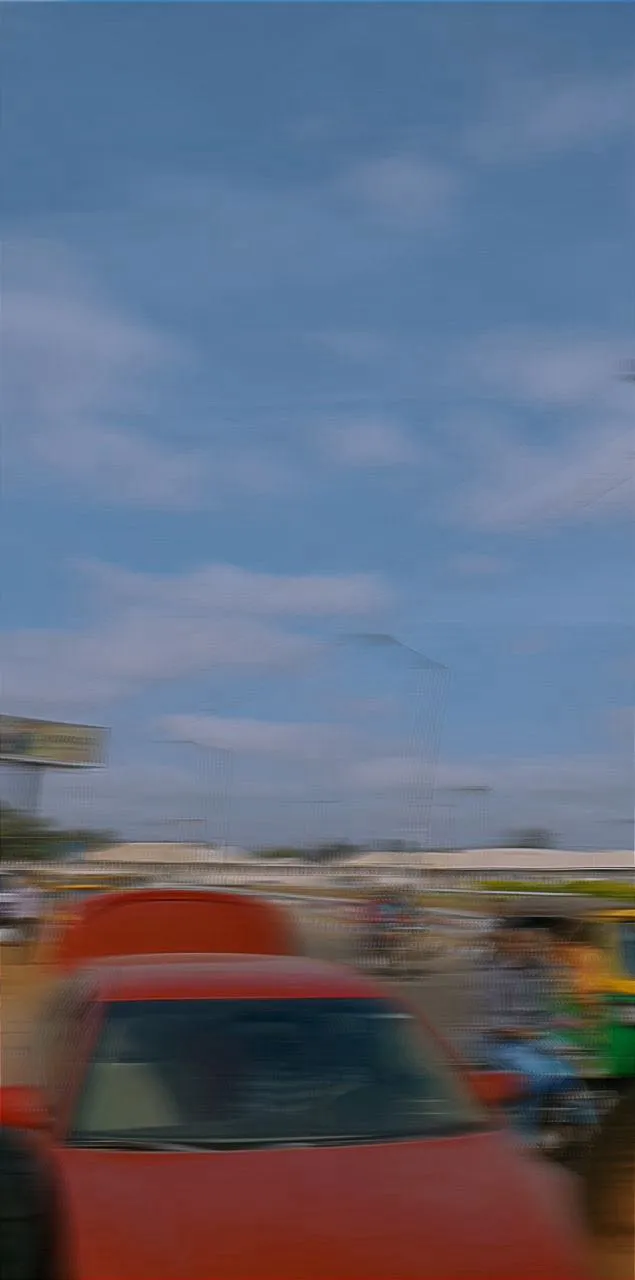
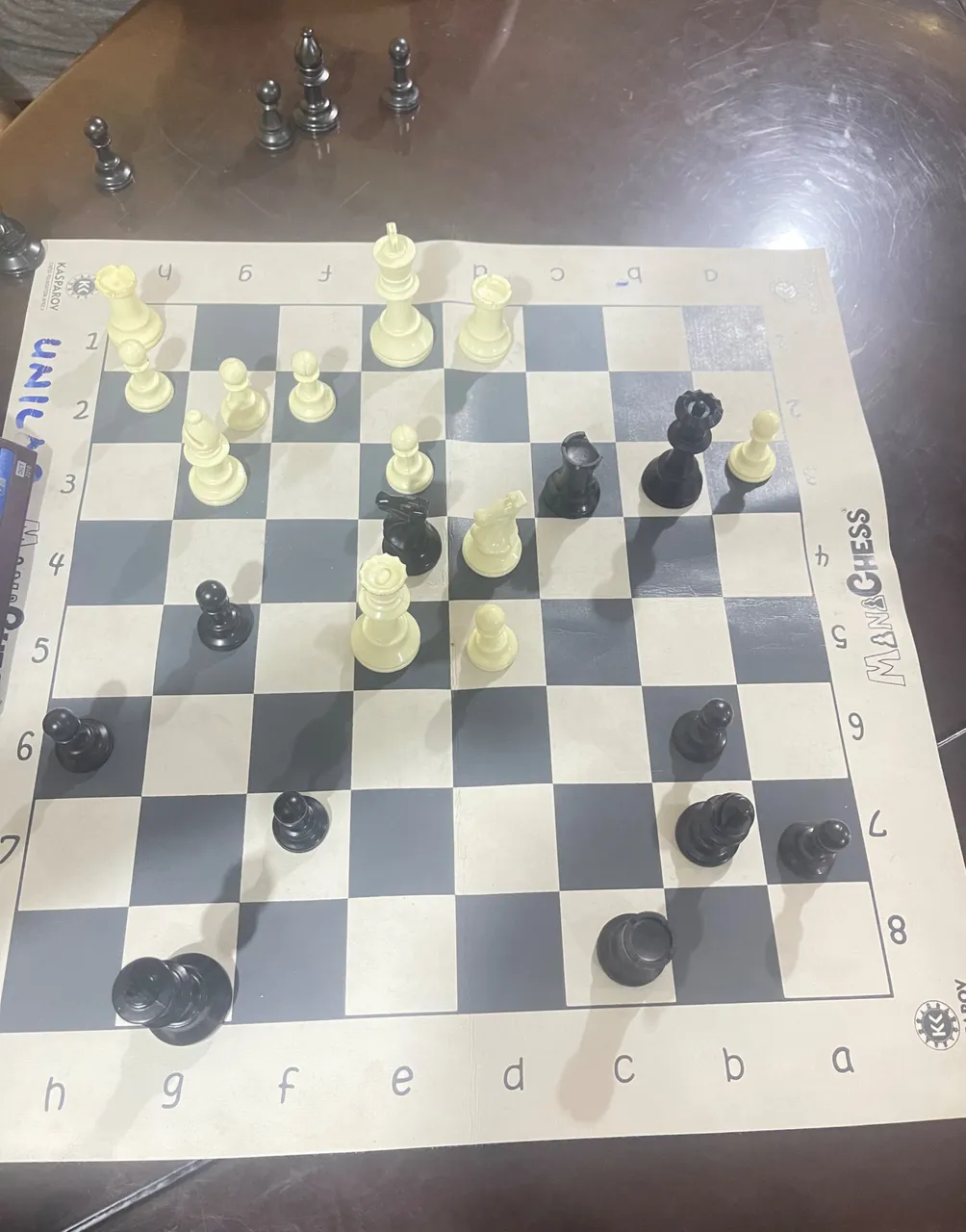
Finally, on Tuesday, I got it! my new passport. I couldn’t contain my excitement. I immediately sent my confirmation email to accept the invitation and began preparing for the journey back home. The trials were now just days away, and I had to get my body and mind in shape fast.
In the end, due to the passport clause, only four of the top 10 invited players could participate.
Arrival day came. I made my way to the venue hotel. On the way, I spotted a wine store and something came over me I decided to buy a bottle to celebrate in advance. “I’ll pop this when I win the qualifiers,” I told myself.
As I walked into the venue, I could already feel the tension in the air. That unmistakable tournament atmosphere — cold, serious, focused. Everyone looked ready for war.
We had the technical meeting and went over the regulations. With just four players, the format was changed to a double round robin. That meant playing each opponent twice — once with white, once with black.
I was ranked second going into the tournament. It was clear: only the very best version of me could win this.
Day One: A Rough Start
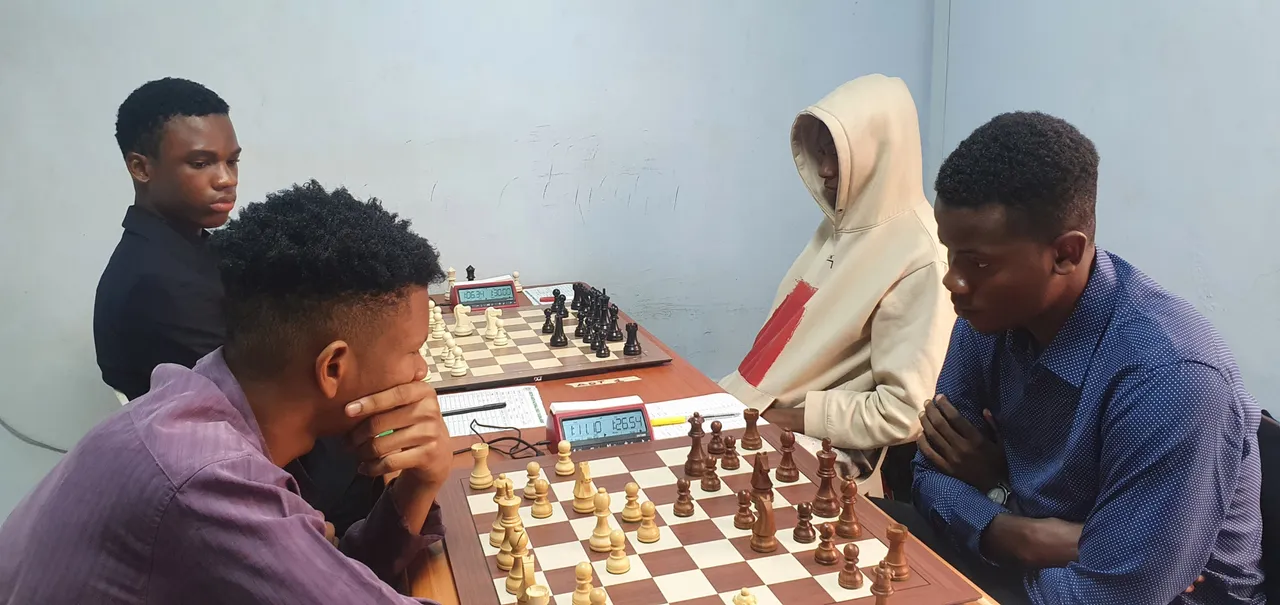
The next day came, and I was paired against the third seed, Eyentonghan Callistus. The game started out well for me, but I eventually slipped into a passive position in the middlegame, constantly defending and holding on. It all ended on the 37th move when I saw the sequence my opponent had lined up clean and decisive. I had to resign.
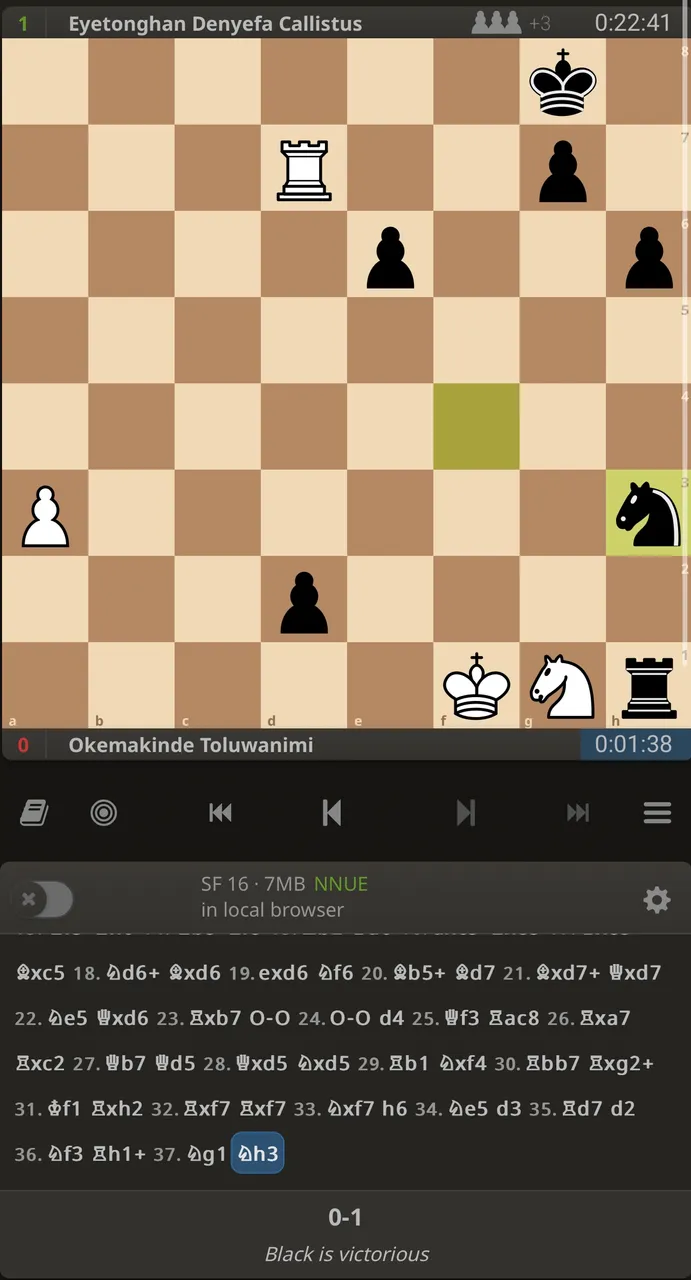
It was painful losing the very first round of the tournament, especially after all I went through to be there. But I tried my best not to let it get to me, knowing I had to stay focused, two rounds were scheduled daily for the next three days.
Later that afternoon, the second round began. This time, I was paired with the number one seed, Okeke Isaac a long-time rival. I had the black pieces, and right from the opening, I could tell he came fully prepared. He played the Scotch Gambit, an opening I’d never seen him use before. I knew it had to be special prep, likely aimed directly at me.
I took my time to understand the position and search for a solid idea. But after I finally made a move, he responded with a sharp sacrifice that completely shifted the balance. A few moves later, I was knocked out. Unfortunately, I don’t have the game saved, but trust me it was a wild one.
Walking back to my room that evening, I was devastated. Everything I had done to be part of this tournament, the rush to get a passport, everything felt like it was crashing down. With just four rounds left, I was sitting at 0/2.
I knew the only way forward was to take it one step at a time and focus on winning the next game.
Day Two: Fighting Back
The next day, I was paired against the fourth seed, Olisa Tennyson another top junior. Interestingly, we were both off to rough starts in the tournament. I had the white pieces and decided to keep things solid, while he came at me aggressively. I made sure to calculate thoroughly before every move. Then, in the middlegame, I spotted an opportunity.
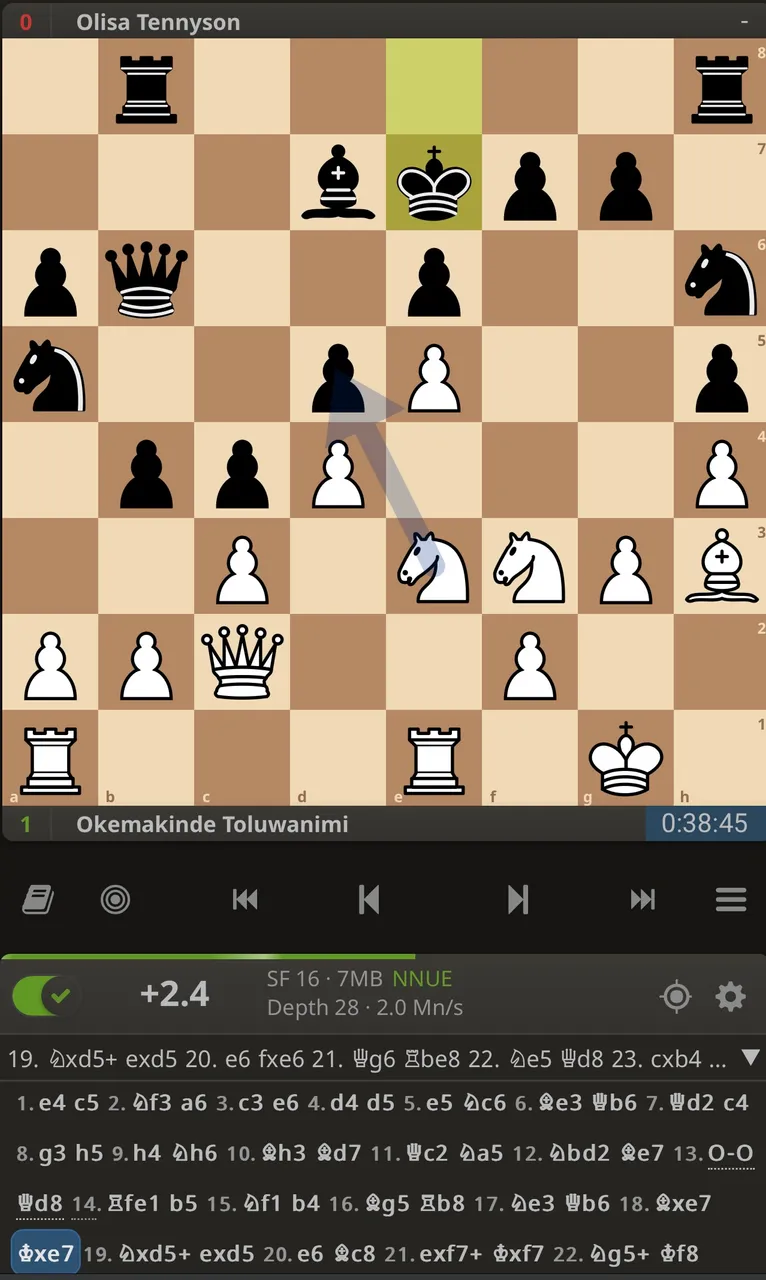
His king was exposed, and I realized I could sacrifice my knight to exploit it.
I suppressed any excitement I felt and calmly reassessed the position. Once I was sure it worked, I went for it. The sacrifice paid off, I gained a crushing advantage and kept up the pressure. He eventually resigned on move 44, right after I played a move that widened the gap even further.
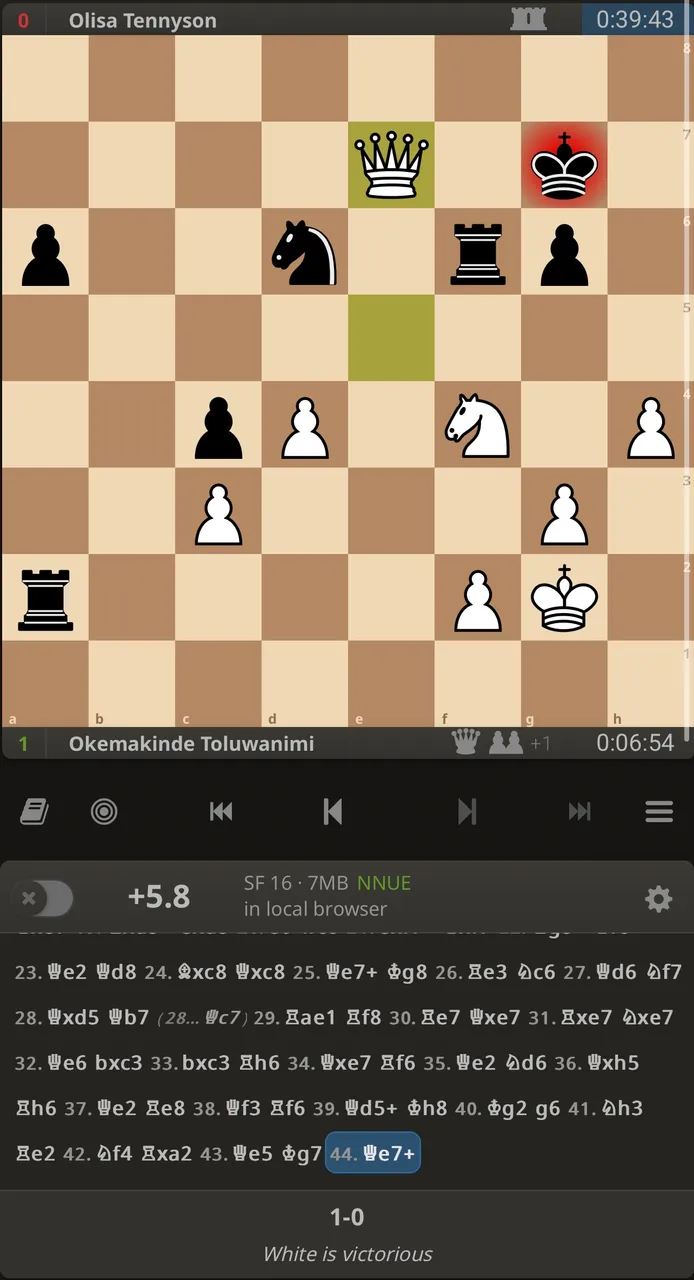
That win was a massive morale booster. A reminder that I could do this.
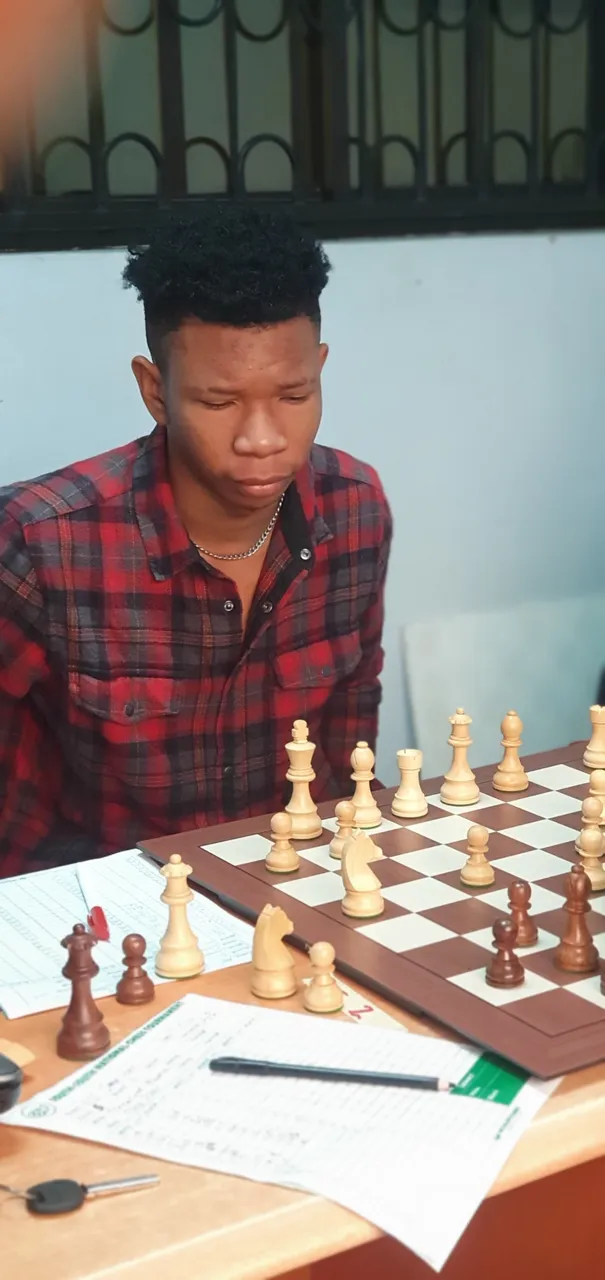
Later that day, I faced Eyentonghan Callistus again for the second time in the tournament. It turned out to be a very long game, both of us played solidly. But then, in the endgame, he made a slight inaccuracy. I grabbed the edge and kept grinding patiently. Eventually, he slipped again, and I landed the decisive blow.
I walked back to my room filled with joy. I had done well that day two crucial wins! My score was now 2 out of 4, and I was closing the gap. Both Okeke Isaac and Eyentonghan Callistus were at 3/4. There was still a chance “a slim one” that I could catch up.
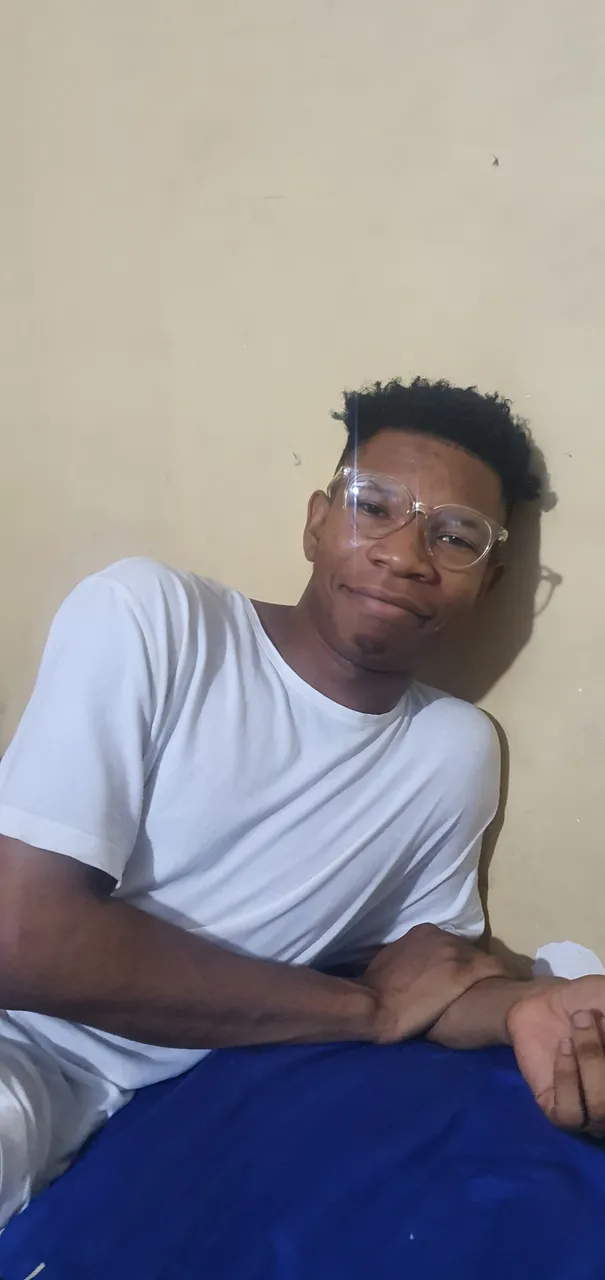
The Final Chase
It was the final day, and I was set to play my second game against Okeke Isaac. I knew what was at stake, anything less than a win would crush my chances. A draw wasn’t enough. I had to go all in.
From the first few moves, I chose violence. I launched into an aggressive opening, and soon, we were both going blow for blow, aiming straight at each other’s kings. It was chaos on the board, but I loved it this was the kind of battle I lived for.
My attack came faster. He didn’t have enough pieces to defend his king. My heart was thumping like crazy, even though I knew I had the advantage. Still, I checked and rechecked my calculations, making sure there was no hidden escape route for him.
And finally he resigned.
Relief. Peace. That was all I felt.
It was another game I would’ve loved to analyze and share, but unfortunately, I can’t find the pgn.
Meanwhile, in the same round, Eyentonghan Callistus drew his game against Olisa Tennyson. That result put Callistus as the sole leader of the tournament, just half a point ahead of me and Okeke Isaac.
I was this close. So close I could almost taste it.
But I knew one thing for sure, I must win my next game to stay in the race
Final Round: Last Shot
In the last round, I was paired against Olisa Tennyson, while Eyentonghan Callistus faced Okeke Isaac. I tried to block out their game entirely and focus on mine though deep down, I knew what was at stake.
If Callistus won, he would win the trial outright. But if that game ended in a draw or a loss, and I managed to win mine, I would tie for first place.
So all I could do was win and hope for the best.
The game stretched on for hours. I had the better position early on, but instead of rushing, I played with care, improving my pieces, controlling the board. Eventually, the win came. I breathed out deeply and finally turned my eyes to the other board.
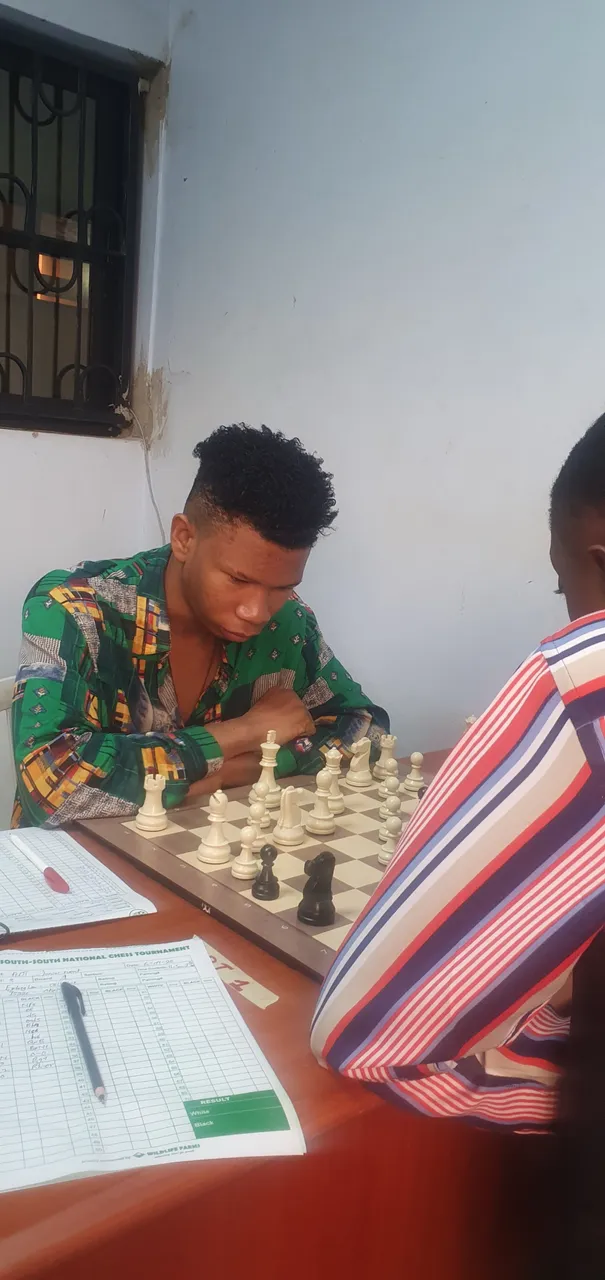
Callistus wasn’t cruising, he was fighting. I watched as tension hung in the air between him and Okeke. After more than an hour of intense play, the game ended in a draw.

We were tied. Both of us finished on 4/6. I was now one step closer but the journey wasn’t over yet.
The Tiebreak Showdown
A playoff was set to determine who would become champion and represent Nigeria at the World Junior Chess Championship. The format: two rapid games. If still tied, it would go down to Armageddon — White gets 5 minutes, Black gets 4, but White must win while Black only needs a draw.
The first rapid game was tense, careful, and ended in a draw. The second one was more aggressive, but again — draw.
It was time for the ultimate decider.
The Armageddon!
We picked colors blindly — I drew White. That meant I had to win.
The pressure was unreal. My heart pounded louder than the ticking clock. Just a few moves in, disaster struck. I missed a tactical shot: his knight forked my two rooks. I was now an exchange down.
I told myself I couldn’t collapse. I regrouped, reorganized, and launched a fresh attack. And somehow worked. I equalized. Then I gained a pawn. Then another. Suddenly, I was winning.
Then came a critical moment, I had to make a decision. I could exchange pieces and simplify, but it risked making the position too drawish. After deeper calculation, I spotted what looked like a brilliant piece sacrifice. It would stop his counterplay and keep my advantage.
I played it.
But the second I let go of the piece, I knew it was a blunder.
Just like that, the tide turned. Callistus found all the best moves. My position got weaker and duller. Eventually, I lost.
We shook hands.
And I left the hall crying hard, regretting that one move that cost me everything.
Almost Wasn’t Enough
A few minutes later, I returned for the closing ceremony. Eyentonghan Callistus was officially crowned champion and awarded full sponsorship to represent Nigeria at the World Juniors.
I was given a consolation prize,some decent prize money. It wasn’t what I wanted, but it reflected my effort.
As we left the hall to head back to our rooms, a crazy idea popped into my head:
What if I tried going to the World Juniors anyway?